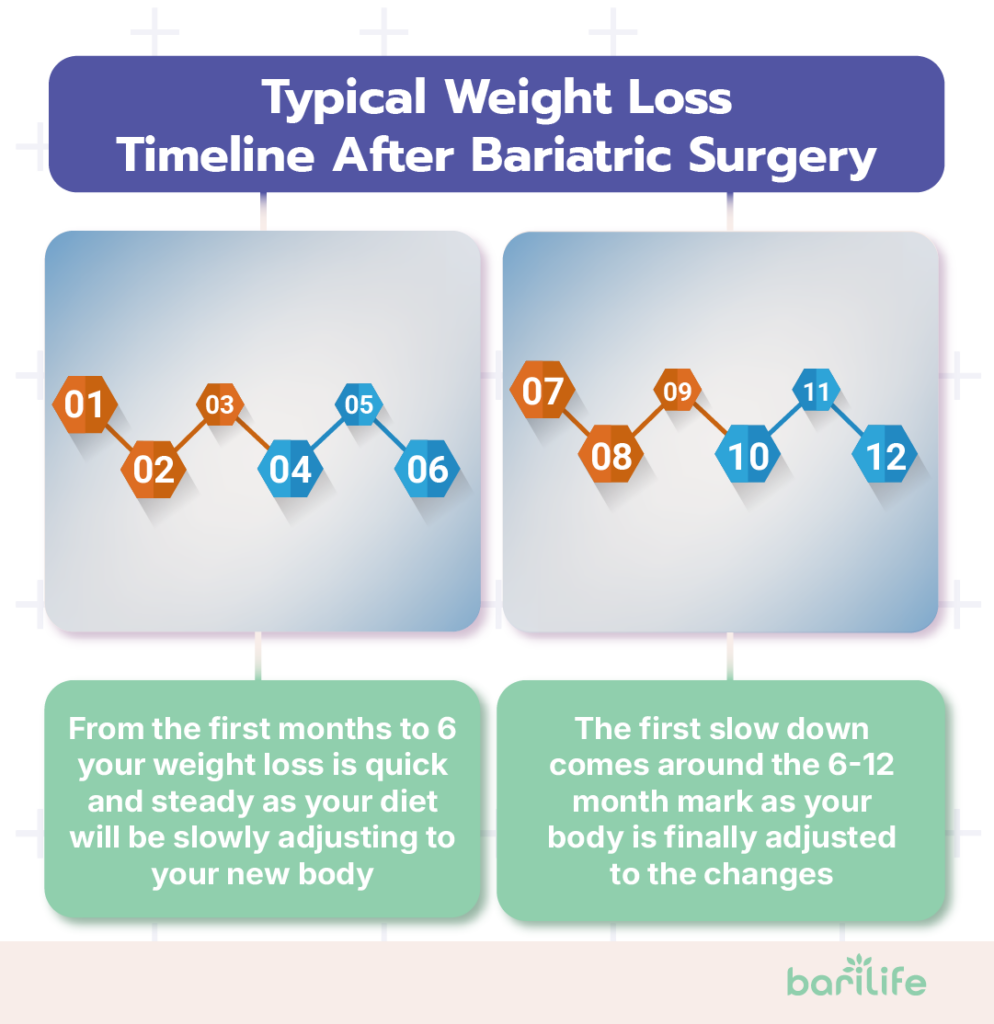Key Takeaways:
- Different types of bariatric weight loss procedures produce varying weight loss results, with gastric bypass and duodenal switch typically achieving the highest percentage of excess weight loss.
- Most people lose 20-30% of their excess weight within the first year after surgery, with the most drastic weight loss happening within the first six months.
- Long-term success depends on following nutritional guidelines, staying physically active, and attending regular medical follow-ups.
It’s normal to wonder how much weight can you lose with bariatric surgery if you’re considering it. While everyone’s case is unique, knowing the average helps you to have realistic expectations and goals for your journey.
The surgery isn’t just for aesthetic reasons—it also helps improve health conditions like diabetes, high blood pressure, sleep apnea, and joint pain.
Let’s break down what you can expect during your weight loss journey after different types of bariatric procedures.
Table of Contents
Types of Bariatric Surgery and Their Impact on Weight Loss

Not all weight loss surgeries produce the same effects. The type of procedure you get greatly influences how much weight you lose.
Gastric Bypass (Roux-en-Y)
This surgery is often regarded as the “gold standard” of bariatric procedures. It works in two ways: first, by creating a small stomach pouch that limits how much you can consume, and second, by rerouting your digestive tract to reduce calorie absorption. The average weight loss for individuals who have undergone gastric bypass is quite impressive. Most lose approximately 60-80% of their excess weight within the first two years.
Sleeve Gastrectomy
This is another procedure that is becoming increasingly popular due to its simplicity and effectiveness. During this procedure, about 80% of your stomach is removed, leaving a banana-shaped “sleeve” that restricts food intake. The bariatric surgery average weight loss with sleeve gastrectomy is typically 60-70% of excess weight within the first two years. The procedure also reduces hunger hormones, helping you feel satisfied with smaller portions of food.
Adjustable Gastric Band
This is a procedure where a silicone band is placed at the upper portion of your stomach to create a small pouch. This limits how much food you can consume at once. Weight loss after bariatric surgery of this type tends to be more gradual, with an average excess weight loss of 40-50% over a three-year period.
While this may seem less impressive, the gradual nature can benefit some people. However, band procedures require more frequent follow-up visits for adjustments and have higher rates of additional surgeries.
Biliopancreatic Diversion with Duodenal Switch (BPD/DS)
This complex procedure is a combination of sleeve gastrectomy and bypassing a large portion of the small intestine. According to research, the average maximum weight loss two years after surgery is 80%.

While these results are impressive, this surgery also carries the highest risk of nutritional deficiencies and complications. This is why it requires rigorous follow-up care and lifelong supplementation.
Factors That Influence Weight Loss Success After Bariatric Surgery
While surgery can significantly aid in weight loss, your post-surgical habits play a crucial role in determining your results. Several key factors influence how much weight you’ll lose and how well you’ll maintain that loss long-term.
Adherence to dietary guidelines is perhaps the most important factor within your control. After surgery, you’ll need to follow a specific eating plan that typically includes:
- Eating small, protein-rich meals
- Chewing food thoroughly
- Avoiding high-calorie liquids
- Taking prescribed vitamins and supplements
- Avoiding sugary and high-fat foods
Regular physical activity significantly improves weight loss results and improves your overall health. Within hours after surgery, you’ll be encouraged to walk regularly, gradually increasing your activity level.
Psychological support also plays a vital role in your long-term success. Many people have emotional connections to food that surgery doesn’t address. Follow-up care also ensures you stay on track and address any issues promptly.
Regular check-ups with your bariatric team allow them to track your weight loss, nutritional status, and overall health. They can spot potential problems early and help you adjust your approach.
Typical Weight Loss Timeline After Bariatric Surgery
Weight loss typically follows a predictable pattern, though each person’s situation varies. For those wondering how to lose weight after bariatric surgery, understanding this timeline can help set expectations:
First Three Months
This is when you’ll likely see the most dramatic changes on the scale. Most people lose weight rapidly during this period, often two to four pounds per week.
This rapid loss occurs because you consume very few calories while your body is adjusting to the changes. You’ll move from a liquid diet to pureed foods and then to soft foods during this time.
Three To Six Months

Weight loss continues steadily during this period, though typically at a slightly slower rate of one to two pounds per week.
Your diet will expand to include more regular foods, although in much smaller portions than before surgery. Many people find that their energy levels improve significantly during this phase as their body adjusts to the weight loss.
Six to 12 Months
During this period, weight loss typically slows to about one to two pounds per month. This is completely normal. By the one-year mark, most people reach 23–28% of their excess weight loss goal, depending on the type of surgery.
Beyond One Year
After the first year, weight loss generally slows down, with most people reaching their maximum weight loss around 18-24 months after surgery. Some continue to lose small amounts in the second year, particularly with consistent exercise. The focus shifts from losing weight to keeping the weight and healthy habits.
Remember that weight loss isn’t always linear. Most people experience plateaus where the scale doesn’t move for weeks despite following all guidelines. These plateaus are normal and temporary—it’s your body’s way of adjusting to the rapid changes.
Long-Term Weight Maintenance
The average weight that’s lost after bariatric surgery is impressive, but maintaining that loss requires ongoing effort.
Years after surgery, you’ll need to stay consistent with your healthy diet. While it will be more varied than in the early post-operative phase, the basic principles remain:
- Eat protein-rich foods first
- Keep portions small
- Limit high-sugar and high-fat foods
- Avoid grazing between meals
- Stay mindful of liquid calories
Many successful people find that occasionally tracking their food intake helps them stay accountable, especially if they notice small amounts of weight creeping back.
Regular physical exercise is also important for long-term success. It helps maintain muscle mass, enhances metabolism, and prevents weight regain. Many people who maintain their weight loss for 5+ years report that regular physical activity is non-negotiable in their routine. Finding activities you genuinely enjoy makes this easier to sustain.

It’s also crucial to attend regular medical checkups to ensure good health and nutritional status. Annual visits are typically recommended to check vitamin levels, weight maintenance, and other health markers. Don’t skip these appointments, even if you’re feeling great—they’re essential for preventive care.
Support systems provide encouragement and accountability for the long haul. Whether through formal support groups, online communities, or friends and family who understand your journey, having people to share challenges and successes with makes maintenance easier. Many bariatric surgery programs offer long-term support groups specifically for this purpose.
Potential Challenges
While the bariatric surgery expected weight loss numbers are impressive, the journey isn’t without challenges. Being prepared for these hurdles can help you deal with them successfully.
Nutritional Deficiencies
Nutritional deficiencies are common concerns after bariatric surgery, especially with procedures that affect nutrient absorption. You’ll need to take vitamin and mineral supplements daily for life. Common deficiencies include vitamin B12, iron, calcium, vitamin D, and protein. Regular blood tests can help find and address these issues before they cause symptoms. If they’re left untreated, these deficiencies can result in problems like anemia, bone loss, hair loss, and fatigue.
Psychological Adjustments
Psychological adjustments also continue long after physical healing. Your relationship with food, your body image, and even your relationships with others may change after significant weight loss. Some people experience “transfer addiction,” where food addiction is replaced with another problematic behavior.
Others struggle with the attention their changed appearance attracts. It’s best to work with a therapist who is familiar with bariatric issues so they can help you navigate these challenges.
Lifestyle Changes
Some people might struggle with the permanent lifestyle modifications required after bariatric surgery. You’ll need to continue eating differently, exercising regularly, and prioritizing your health indefinitely.
Medical Complications

Medical complications, which can occur shortly after surgery and years later, are also a concern. Short-term risks include infection, bleeding, and blood clots. Long-term issues might include hernias, bowel obstructions, ulcers, or gallstones. Some people experience dumping syndrome after eating foods high in sugar or fat. It’s important to know these warning signs and seek prompt medical attention to minimize these complications.
Conclusion
Most people experience their most rapid weight loss in the first six months, with continued steady progress through the first year. Weight typically stabilizes between 18 and 24 months after surgery. Your long-term success largely depends on permanent lifestyle changes, including healthy eating habits, regular physical activity, ongoing medical care, and psychological support. While challenges do exist, being prepared and proactive helps ensure the best possible outcome.
How Bari Life Can Help
Proper nutrition is essential for achieving optimal weight loss after bariatric surgery while staying healthy and energetic throughout your journey. Bari Life offers specialized bariatric vitamins designed specifically for people who have undergone weight loss surgery.
Our bariatric protein shakes are a great way to meet your protein needs, ensuring you stay strong and nourished. You can also benefit from our bariatric multivitamins that provide essential nutrients to support your recovery and long-term health. For those who prefer a more convenient option, we offer bariatric vitamins chewable, making it easier to get the vitamins you need every day.
In addition to vitamins, our wide selection of bariatric snacks are perfect for maintaining energy levels without compromising your diet. For those needing additional support for bone health, we offer bariatric calcium chews to help maintain strong bones and teeth.
Our bariatric multivitamin with iron is specially formulated to provide the necessary nutrients and combat iron deficiencies that can occur after bariatric surgery. For those who have trouble with pill swallowing, we have liquid bariatric vitamin options to ensure you get all the nutrients you need.
To fuel your day, try our bariatric protein bars, packed with high-quality protein to keep you satisfied and energized. You can also promote gut health with our bariatric probiotic, which supports digestion and overall wellness.
Additionally, if you’re concerned about bariatric vitamins for hair loss, we offer specially formulated vitamins to help combat hair thinning and promote healthy hair growth during your weight loss journey.
Visit Bari Life today to discover how our specialized supplements can support your weight loss journey and help you achieve the best possible results from your bariatric surgery!”
If you want to learn more, why not check out these articles below:
Resources
Gastric Bypass Vs Gastric Sleeve. (N.D.). UPMC.
Hess, D.S., et al. (1998). Biliopancreatic diversion with a duodenal switch. Obes Surg.
Laparoscopic Adjustable Gastric Band Care. (N.D.) Penn Medicine.
Transfer Addiction Following Bariatric Surgery. (2016). OAC.



Hi, my name is Amy. Just had Gastric Sleeve Surgery 1 month ago, tomorrow…just wondering, as this was never told to me…what happens to the 80 percent of the stomach that is removed?? Do they take it out Laporascopically?
i just had my Gastric Sleeve done on April 13, 2024 and I was told that the do remove the part of the stomach they just cut off of the “new stomach”.